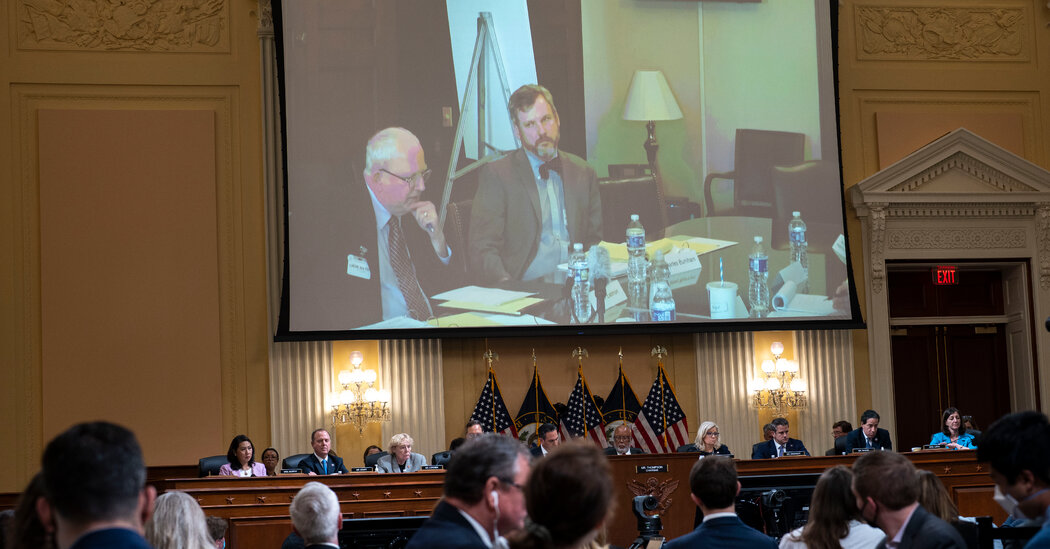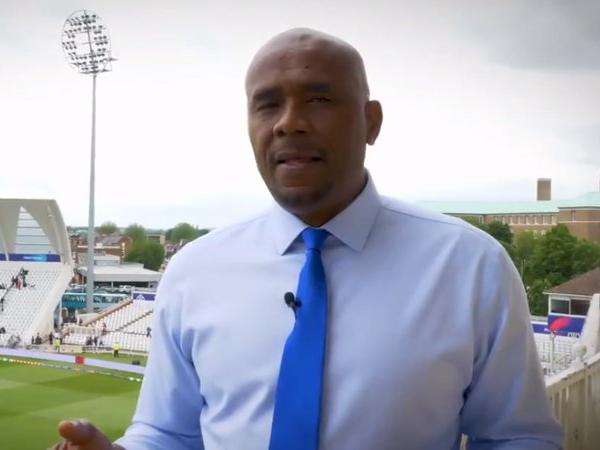

John Eastman, the conservative lawyer whose plan to block congressional certification of the 2020 election failed in spectacular fashion on Jan. 6, 2021, sent an email two weeks later arguing that pro-Trump forces should sue to keep searching for the supposed election fraud he acknowledged they had failed to find.
On Jan. 20, 2021, hours after President Biden’s inauguration, Mr. Eastman emailed Rudolph W. Giuliani, former President Donald J. Trump’s personal lawyer, proposing that they challenge the outcome of the runoff elections in Georgia for two Senate seats that had been won on Jan. 5 by Democrats.
“A lot of us have now staked our reputations on the claims of election fraud, and this would be a way to gather proof,” Mr. Eastman wrote in the previously undisclosed email, which also went to others, including a top Trump campaign adviser. “If we get proof of fraud on Jan. 5, it will likely also demonstrate the fraud on Nov. 3, thereby vindicating President Trump’s claims and serving as a strong bulwark against Senate impeachment trial.”
The email, which was reviewed by The New York Times and authenticated by people who worked on the Trump campaign at the time, is the latest evidence that even some of Mr. Trump’s most fervent supporters knew they had not proven their baseless claims of widespread voting fraud — but wanted to continue their efforts to delegitimize the outcome even after Mr. Biden had taken office.
Mr. Eastman’s message also underscored that he had not taken on the work of keeping Mr. Trump in office just out of conviction: He asked for Mr. Giuliani’s help in collecting on a $270,000 invoice he had sent the Trump campaign the previous day for his legal services.
The charges included $10,000 a day for eight days of work in January 2021, including the two days before Jan. 6 when Mr. Eastman and Mr. Trump, during meetings in the Oval Office, sought unsuccessfully to pressure Vice President Mike Pence to go along with the plan to block congressional certification of the Electoral College results on Jan. 6. (Mr. Eastman appears never to have been paid.)
A lawyer for Mr. Eastman did not respond to a request for comment.
Disclosure of the email comes at a time when the Justice Department is intensifying its criminal investigation of the effort to overturn the 2020 election. Patrick F. Philbin, who was a deputy White House counsel under Mr. Trump, has received a grand jury subpoena in the case, a person familiar with the situation said.
Mr. Philbin is the latest high-ranking former White House official known to be called to testify before the grand jury. Others include his former boss, Pat A. Cipollone, who as White House counsel argued, along with other White House lawyers, against some of the more extreme steps proposed by Mr. Trump and his advisers as they sought to hold onto power.
Earlier subpoenas to a number of people had sought information about outside lawyers, including Mr. Eastman and Mr. Giuliani, who were advising Mr. Trump and promoting his efforts to overturn the results.
In June, federal agents armed with a search warrant seized Mr. Eastman’s phone, stopping him as he was leaving a restaurant in New Mexico.
Making a case against Trump. The House committee investigating the Jan. 6 attack is laying out a comprehensive narrative of President Donald J. Trump’s efforts to overturn the 2020 election. Here are the main themes that have emerged so far from eight public hearings:
In testimony to the House committee investigating the Jan. 6 attack on the Capitol, another White House lawyer, Eric Herschmann, said that on Jan. 7, 2021, Mr. Eastman brought up with him the idea of pursuing litigation in Georgia. Mr. Herschmann said he responded that Mr. Eastman was out of his mind, adding that he told Mr. Eastman: “I only want to hear two words coming out of your mouth from now on: orderly transition.”
Mr. Herschmann, by his account, went on to tell Mr. Eastman that he should get a great criminal defense lawyer because he was going to need one.
The newly disclosed email shows that Mr. Eastman did not let up even after Mr. Biden had been sworn in. It was sent after the Trump campaign had raised tens of millions of dollars from solicitations to Mr. Trump’s supporters suggesting the money would be used to fight voting fraud, even as the claims made by Mr. Trump and his allies were rejected by the courts and broadly debunked even by Mr. Trump’s own Justice Department.
In proposing to use the Georgia runoff elections as a route to finding fraud in the general election held months earlier, Mr. Eastman was implicitly conceding that other, more direct accusations of fraud had failed to find any traction.
The email suggests that Mr. Eastman saw the courts in Georgia as an investigative tool, using the discovery process, for continuing to try to bolster claims that had already been dismissed.
“We need to figure out how to keep up the fight,” Mr. Eastman wrote. “I’m inclined to pursue an election challenge to the Georgia runoff election, using what we already have learned (huge statistical anomalies, violations of Georgia law, etc.) as the basis. Under Georgia law, a challenge can be brought by any qualified voter, even if the candidates themselves are not interested.”
In the email, Mr. Eastman argued that if the group of lawyers and Trump advisers involved in the effort could find fraud in the Jan. 5 runoff elections in Georgia — which were won by Raphael Warnock and Jon Ossoff, both Democrats — they could vindicate themselves for the claims they made about the November election.
Toward the end of the email, Mr. Eastman implied that the Trump campaign could fund the ongoing efforts. He named a team of lawyers he would recommend, but he said two of them needed their outstanding Trump campaign bills paid before they would consider taking on the work.
Mr. Eastman was not alone in seeking payment from the campaign’s swelled coffers for efforts to keep Mr. Trump in office. An associate of Mr. Giuliani sent an email to the campaign shortly after Election Day in 2020 seeking $20,000 a day in compensation for Mr. Giuliani. At the time, Mr. Giuliani was urging Mr. Trump to keep fighting the results of the election and jumped at the chance to lead the legal efforts doing just that.
But Mr. Trump told his advisers at the time that Mr. Giuliani would only get “paid on the come,” a reference to a bet in the casino game craps that is essentially payment on a successful roll of the dice, according to two people with knowledge of the discussions.
Mr. Eastman told some of Mr. Trump’s aides that he was working for free, according to one of the people with knowledge of the discussions. At the same time, he had developed a private arrangement with another lawyer working on Mr. Trump’s efforts, Bruce Marks, to be compensated through Mr. Marks, although it does not appear he received money that way.
By the time Mr. Biden became president, Mr. Eastman tried to be paid directly, the Jan. 20 email shows, although two people with knowledge of the campaign’s finances said he never was. In addition to seeking to be paid for his time working with the White House in January, he sought to bill the Trump campaign $125,000 for his work on a lawsuit filed by the Texas attorney general seeking to have the election results in a number of battleground states invalidated. The suit was quickly thrown out by the Supreme Court.
Since the Capitol riot, Mr. Eastman has gone from a little-known conservative law professor to the best-known legal architect and promoter of the plan to use purported slates of electors backing Mr. Trump in an attempt to block or delay Congress’s certification of Mr. Biden’s victory on Jan. 6.
His actions have been a focus of both the Justice Department inquiry and the House committee investigating the Jan. 6 attack and what led to it. Mr. Eastman repeatedly invoked his Fifth Amendment right against self-incrimination when questioned by the committee.
During in-person meetings at the White House in the days before Jan. 6, Mr. Eastman tried to persuade Mr. Pence and his top lawyer, Greg Jacob, to go along with the plan to overturn the election.
At the first meeting, on Jan. 4, Mr. Trump and Mr. Eastman brought Mr. Pence and two of his top aides, Mr. Jacob and Marc Short, to the Oval Office. That meeting was followed by another, on Jan. 5, during which Mr. Eastman sought again to persuade Mr. Jacob to go along with the scheme.
After Mr. Jacob refused, Mr. Trump publicly pressured Mr. Pence in front of a raucous crowd of his supporters at the Ellipse on Jan. 6. Later that day, when a pro-Trump mob was attacking the Capitol, Mr. Jacob emailed Mr. Eastman blaming him for the violence.
In March, a federal judge ruled in a civil case that Mr. Eastman and Mr. Trump had most likely committed felonies as they pushed to overturn the election, including obstructing the work of Congress and conspiring to defraud the United States.
The actions taken by Mr. Trump and Mr. Eastman, the judge found, amounted to “a coup in search of a legal theory.”
24World Media does not take any responsibility of the information you see on this page. The content this page contains is from independent third-party content provider. If you have any concerns regarding the content, please free to write us here: contact@24worldmedia.com

Marnus Labuschagne Caught Off-Guard By ODI Captain Call After Steve Smith Snub

Everyone Is Looking Forward To It, The Standard Will Be Very High – Jacques Kallis On CSA’s SA20

Danushka Gunathilaka Granted Bail On Sexual Assault Charges

Ramiz Raja Sends Legal Notice To Kamran Akmal For Defamatory, False Claims Against The Board

Harbhajan Singh Reckons Mumbai Indians Should Release Kieron Pollard Ahead Of The IPL Auction 2023

Ian Bishop Praises Sam Curran For His Performances On Bouncy Australian Tracks

Why Choose A Career In Child Psychology?